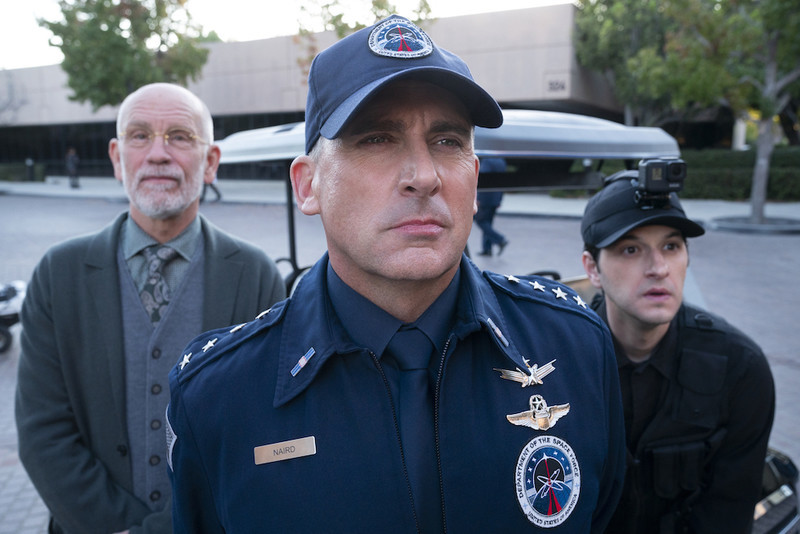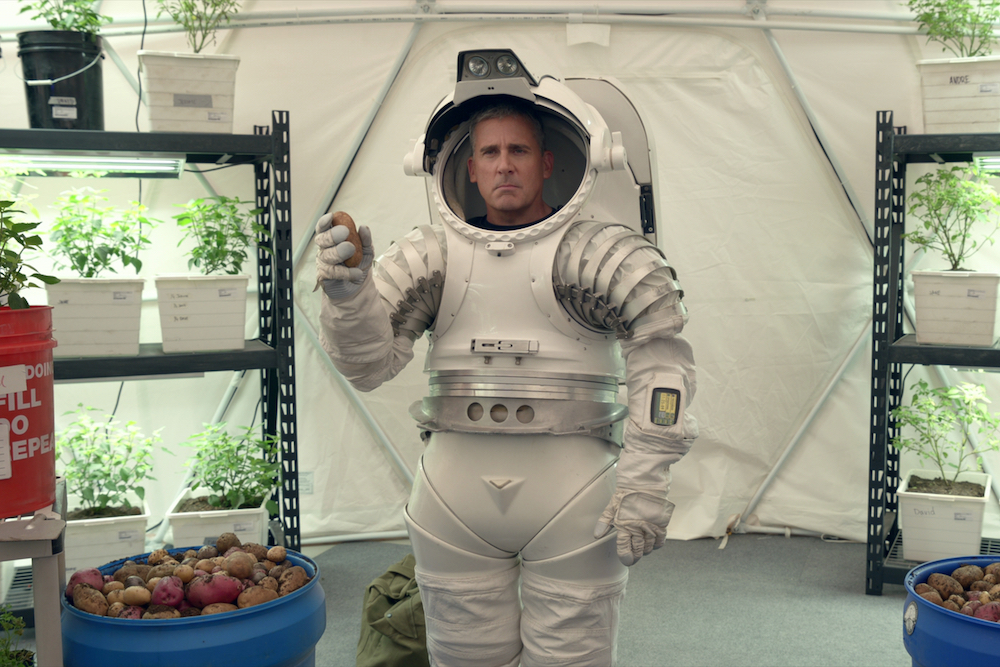There’s a big difference between what Netflix’s new series “Space Force” looks like, and what it actually reveals itself to be. Based on a very dumb, very real concept that our taxpayer money will have to reckon with soon enough, this new show from co-creators Greg Daniels (“The Office”) and Steve Carell is a workplace comedy on a massive scale. In a far cry from the quick zooms of “The Office,” “Space Force”’s IMAX-ready cinematography captures its massive home base and its soon-to-be-wasted rockets, and then brings us real close to its stoic faces of highly-decorated authority, especially if what they are about to say is plain silly. It all looks like “Dr. Strangelove: How I Learned to Stop Worrying and Love the Bomb,” and for its first two episodes, right up through a very funny, high-stakes mission with a chimp-astronaut, it seems like just the satire we need.
But “Space Force” doesn’t declare comedic war on the idea that inspired it, so much as just giggle about the name and then kick around some kooky ways its budget could be wasted by dopey adults. That’s a fair approach too, but it’s a significant drop-off especially as the show proves much quicker with its droll dialogue than the dramatic force involving America trying to take over space. And yet after seeing all of season one I am still recommending this show, in part because adjusting expectations does make it more enjoyable, and it simply is funny enough to warrant a look.

A key factor is Steve Carell, who plays the four-star Air Force general who has been saddled with leading Space Force. Part of the set-up involves a country trying to BS its way into excellence across the galaxy, relying on dedicated Americans to make it so even if they are completely unqualified. That’s Carell’s Mark Naird, who reluctantly accepts the job and moves his wife Maggie (Lisa Kudrow) and daughter Erin (Diana Silvers) to a remote part of Colorado, where a massive base and control center has been built.
Things are of course a complete mess, but “Space Force” has the supporting characters to color its cringe-worthy absurdity. John Malkovich is one of the show’s best casting choices, playing a scientific advisor who has odd-couple chemistry with Carell, the two sharing a friendship while embodying clashes between science and hubris. Always appearing in impeccably clashing fashion, Malkovich is an excellent foil to the shenanigans that gradually unfold, an irritated voice of reason whose snide proclamations about jingoism, guns on the moon, and designer rocket fuel provide some acerbic delight.

A whole lot of other exciting faces enter the mix, and while the script doesn’t dig deep with nearly any of them in a way to make these supporting characters memorable, it’s still a strong batch. Don Lake is continually a delight, and has one of the best ingrained jokes—he’s a one-star general who has simply been relegated to being Naird’s clumsy secretary. Then there’s Jimmy O. Yang, who plays a mission control specialist eye-rolling his way through more blunders, and Ben Schwartz, who plays a media manager nicknamed F**kTony that’s like a less-hyper reprise of his scene-stealing Jean-Ralphio from “Parks and Recreation.” One of the show’s exciting subplots involves Tawny Newsome’s highly-ranked Angela Ali and her own pursuit of becoming an astronaut, after having been pointlessly assigned to being Naird’s personal helicopter driver. Even the late Fred Willard shows up for a few phone calls—like a concerning amount of things that happen throughout the show, he just appears and is then forgotten about, but his screen-time is effective all the same.
One of the show’s greatest feats is that the leader of all of this incompetent power comes off as someone you want to root for. At the end of the day, Mark Naird is a Carell character, so there’s a humanizing softness to him beyond his cartoonish affects (in this case, a low voice and rigid body language), just as Carell’s lonely Michael Scott clearly always had an internal monologue going. This show in fact makes you want to see even more of Naird’s emotional side, or hear more about the seriously traumatic war experiences that have left him so repressed—choppy, sentimental scenes where he’s an absent dad and confused husband don’t give Carell the best output.

“Space Force” leaves some room open for a second season, and I have hope that some frustrating flaws here can be fixed. If anything, there’s a grave lack of immediacy with the course of events that are meant to weigh on Naird’s shoulders; the plotting awkwardly starts and stops, and barely surprising, one-off moments like a mid-season skills competition with the Air Force (and Naird’s personal bully, a general played by Noah Emmerich) are cute at best. For a series that wants to be situational but also build toward the making of American history, “Space Force” can be too loosey-goosey for its own good.
Even with its spikes of laugh-out-loud and clever moments, it can be frustrating when a show feels like it’s settling for simply silly and sweet, and for satire that’s just so easy. (Even its winks at real-life figures, with references to “mavericks” and an outspoken congresswoman from New York, feel like they are sticking with automatic, harmless choices for a modern political satire.) For all of the true context of a military branch born out of hot air, the massive irony is that this show doesn’t seem like it has some grandiose plan either. But it’s telling of its team’s charisma that despite many things going wrong, “Space Force” is still a success.
All of season one screened for review.












